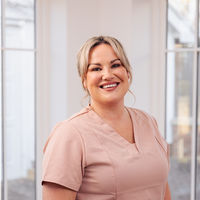When Can You Start Bathing Your Baby?
There’s no rush to give your baby their first bath. In fact, we now recommend waiting at least 24 hours after birth and even longer to allow time for:
-
Skin-to-skin bonding
-
Breastfeeding to establish
-
Vernix (the white, creamy coating on your baby’s skin) to be absorbed, it acts as a natural moisturiser and provides a protective barrier for their developing skin and microbiome
In the first few days, a top-and-tail wash (cleaning the face, hands, neck, and nappy area with cotton wool and warm water) is more than enough.
How Often Should You Bathe Your Baby?
Newborns don’t need a daily bath. 2–3 times a week is plenty in the early weeks. Their skin is delicate and frequent bathing can dry it out.
Of course, you can bathe your baby more often if they enjoy it, or if it forms part of a calming evening routine. Just be sure to use plain water only, or a very gentle, baby-safe cleanser like our Baby Wash, specially formulated with calming calendula, soothing marshmallow, and gentle oatmeal. It's perfect for your baby's very first wash and is kind to even the most delicate newborn skin.
What You'll Need Before You Start
Having everything ready before you begin helps the bath go more smoothly and keeps your baby safe. Here’s a basic checklist:
-
A baby bath or clean washing-up bowl
-
Warm water (body temperature test with your elbow or a bath thermometer: around 37°C)
-
A soft towel (preferably hooded)
-
Cotton wool or a soft cloth
-
Clean nappy, nappy cream and clothes
-
A gentle baby wash suitable for newborns
Safety tip: Never leave your baby unattended during a bath even for a second.
Step-by-Step: How to Bathe Your Baby
-
Wash hands and gather all supplies
-
Fill the bath with just a few inches of warm water
-
Undress your baby, leaving the nappy on at first if you like
-
Clean the face first with cotton wool and cooled, boiled water one piece per eye, wiping from inner to outer corner
-
Hold your baby securely supporting their head and neck with one arm, and using the other to gently wash
-
Lower baby into the water, feet first, keeping their head above the surface
-
Gently wash the body, working from top to bottom
-
Lift baby out carefully, supporting their head and neck, and wrap in a warm towel
-
Dry gently, especially in skin folds, and dress baby in clean cloth
Midwife tip: Your baby may cry during their first few baths, this is normal and doesn’t mean they don’t like it. Try talking, singing, or playing soft music to reassure them.
Should You Use Products?
For the first few weeks, plain water is best, especially if your baby was born full-term and has healthy skin. Their skin is very sensitive, and using soaps or bubble baths too early can cause dryness or irritation.
If you choose to use a product, make sure it’s:
-
Mild and fragrance-free
-
Specifically designed for newborns
-
Used sparingly
Bath Time as Part of a Routine
Bathing doesn’t have to be at night it can be whenever suits your family. That said, many parents find a warm bath in the evening helps their baby relax and wind down before bed.
Some babies love water right away, others take time to adjust. Follow your baby’s lead and take things at your own pace.
When to Be Cautious
Speak to your midwife, GP or health visitor if your baby has:
-
Dry, broken, or irritated skin
-
Umbilical cord that hasn’t fully healed
-
Eczema or other skin conditions
They can guide you on how to adapt bathing to keep baby comfortable.
Final Thoughts
Bathing your baby is more than just keeping them clean it’s a beautiful opportunity to connect, cuddle, and help them feel safe. Like most things in parenthood, it gets easier with time and confidence.
If you’re unsure or feel nervous, reach out to your midwife, health visitor, or postnatal team. You're not alone and you're doing a great job.



















